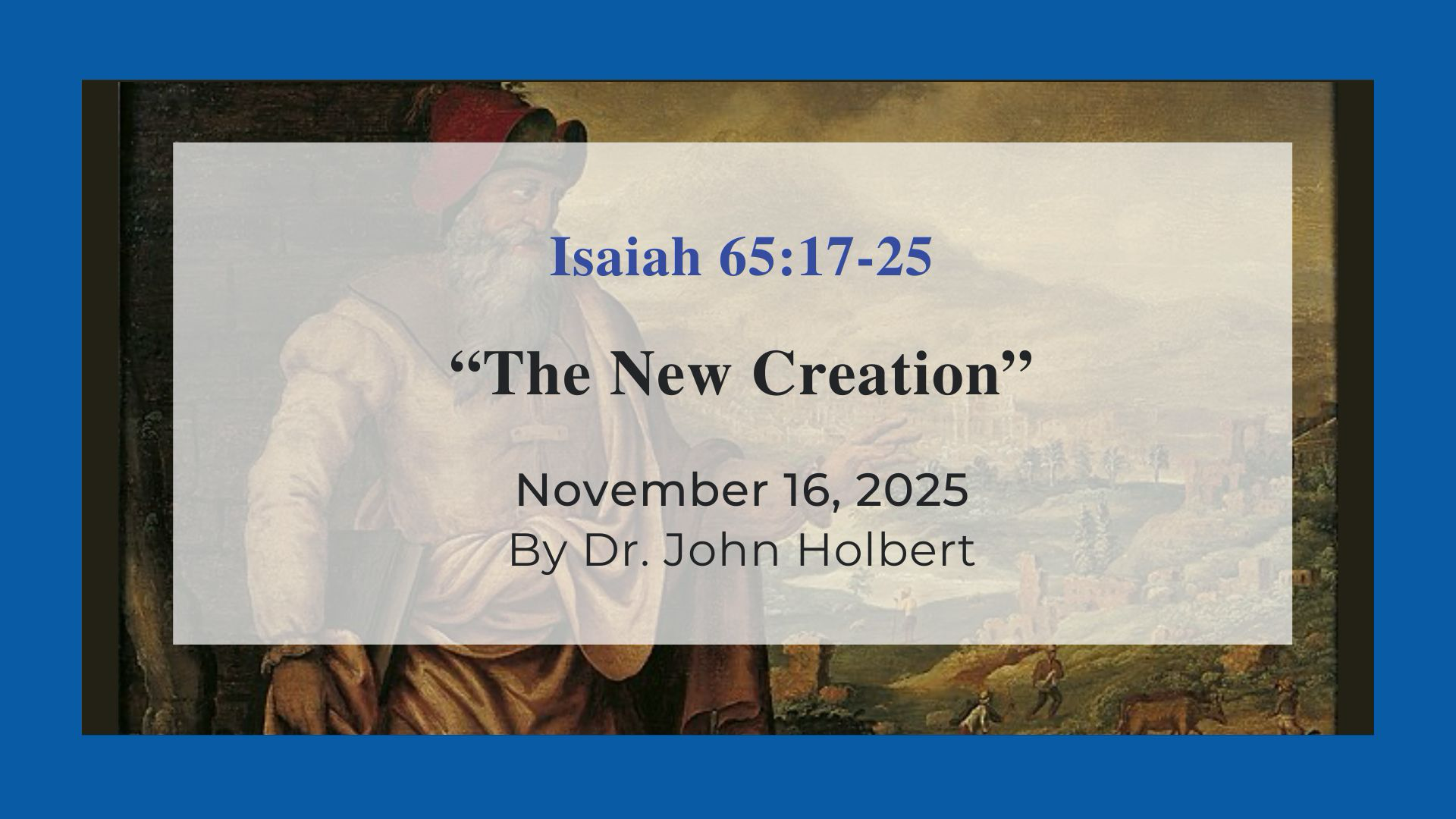The New Creation - Reflections on Isaiah 65:27-25, Pentecost 23, Year C
by John C. Holbert on Thursday, July 3, 2025

As we move ever closer to that grand time of year—the season of Advent and the coming of Jesus into the world—the lectionary regularly turns to Hebrew Bible passages that emphasize the rich possibilities of a future of wonder and glory. Is.65 is one of those passages, replete with metaphors of unforgettable grandeur, focusing directly on a brand new creation, one rife with realities unlike the harsh world that faces the people of Judah, who have just experienced the horrors of the destruction of their beloved city, exile from that city, and the return to the city still essentially in ruins. We cannot be absolutely certain just when this text was composed, but it surely must have found its origin in the years following the return from Babylonian exile of some of the Judean descendants who spent nearly two generations in the capital of the former Babylonian empire, now swallowed by the new great empire of Persia late in the 6th century BCE. The Judah to which they returned in 539BCE was a shell of its former self, with stones of the temple and palace strewn around, populated by former peasants, scratching a meager living in the midst of what remained.
This 3-Isaiah, whoever he was, looked at the dispiriting scene, but saw with prophetic eyes what might still await the people in YHWH’s future. Prophets always see differently than the rest of us, finding hope where none seems to be, speaking words of power to people weary and anxious about their next meal, hardly concerned with any so-called glorious new land. But Isaiah proclaims more to them than seems remotely possible. Just hear some of his lofty language.
“For I am about to create new skies, new earth;
first things will not be remembered,
nor rise in the heart.
But simply be glad and rejoice forever
concerning what I am creating,
For I am about to create Jerusalem as joy,
its people as gladness.
I will rejoice in Jerusalem,
find delight in my people;
No more will weeping be heard in it,
nor distressful cry” (Is.65:17-19).
What the returned exiles and those who remained in the city are looking at—the fallen temple, the shattered homes, the impassable streets, the shuttered shops—are about to be altered forever, says Isaiah. New skies and earth will usher in joy and gladness, and instead of weeping and cries of anguish, there will be joy on every lip, gladness in every heart, and even YHWH will be delighted with these people.
And Isaiah waxes even more lyrical, describing s future quite unimaginable.
“No more shall there be in it an infant who lives a few days,
nor an old person who does not fill up their days,
for a person who dies at 100 shall be thought a mere youth;
anyone falling short of 100 will be considered cursed!
They shall build houses and live there;
they shall plant vineyards and eat the fruit;
They shall not build for another to dwell;
they shall not plant and another eat;
like the days of a tree shall my people be;
my chosen will long enjoy the work of their hands” (Is.65:20-22).
Portraits of old age for all rather than truncated lives, houses for the citizens of the city, rather than for usurpers, vineyards for the locals rather than for foreigners, long, productive, and delightful labor for all inhabitants, Isaiah promises all this from the mouth of YHWH. In this halcyon day, “before they call, I will answer, while they are speaking I will hear already” (Is.65:24), promises YHWH. The realtionships between people and God will be so intimate that God’s reply to their requests will happen even before they are spoken, supplied even while the requests are being voiced.
And then Isaiah quotes famous words from his prophetic Isaianic forebear to round out his magical picture of a new heaven and new earth.
“The wolf and lamb will feed as one;
the lion just like the ox shall eat straw,
while the serpent food will be dust!
They shall not hurt or destroy anywhere on my holy mountain,
says YHWH” (Is.65:25).
These lines of course come from Is.11:9, with some variation, lines made famous by their use each year in Advent. Here, they conclude 3-Isaiah’s wonderful picture of the substance of YHWH’s promised new heaven and earth. For those living in Jerusalem late in the 6th century BCE, all of this must have seemed like absurd nonsense, made ridiculous by the stark realities of a Jerusalem in turmoil and confusion. However, soon some attempts would be made by the people to rebuild—as we saw last week, Haggai appeared in the city in the late summer of 520 and urged the people to begin to rebuild the ruined temple, and in 515 that temple was rededicated. In short, Isaiah’s seemingly stupid fancies bore some practical fruit; YHWH had not left them after all! It is always crucial to pay attention to our prophets, even when their words seem so inane. They see what we often cannot and bring the new work of God into a world in desperate need of that work.
